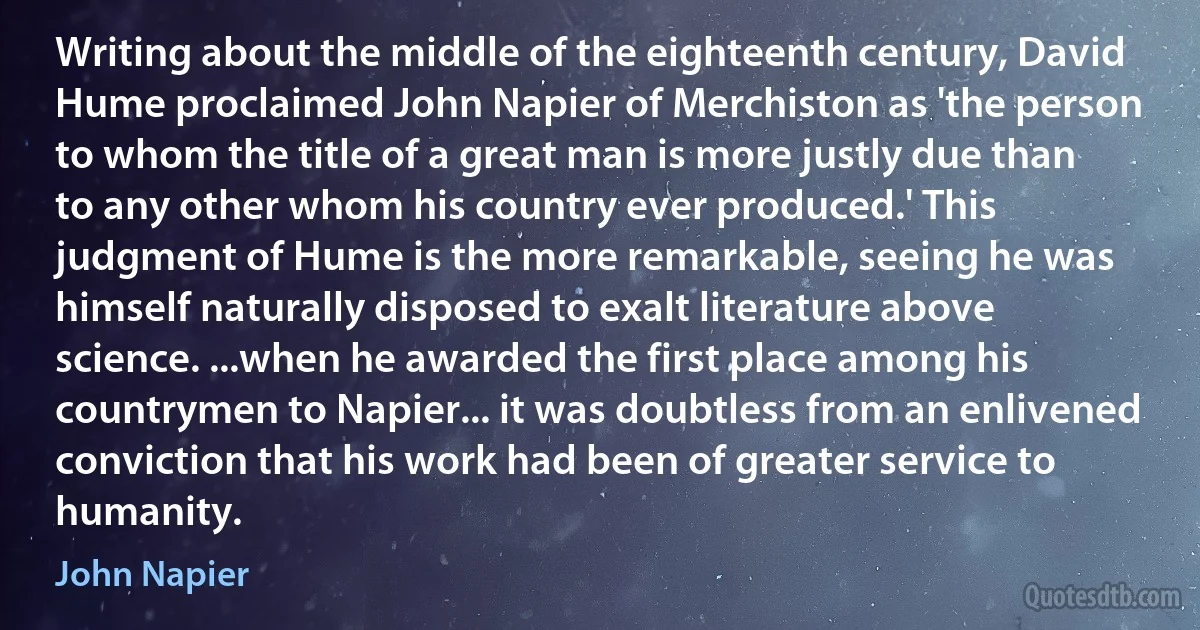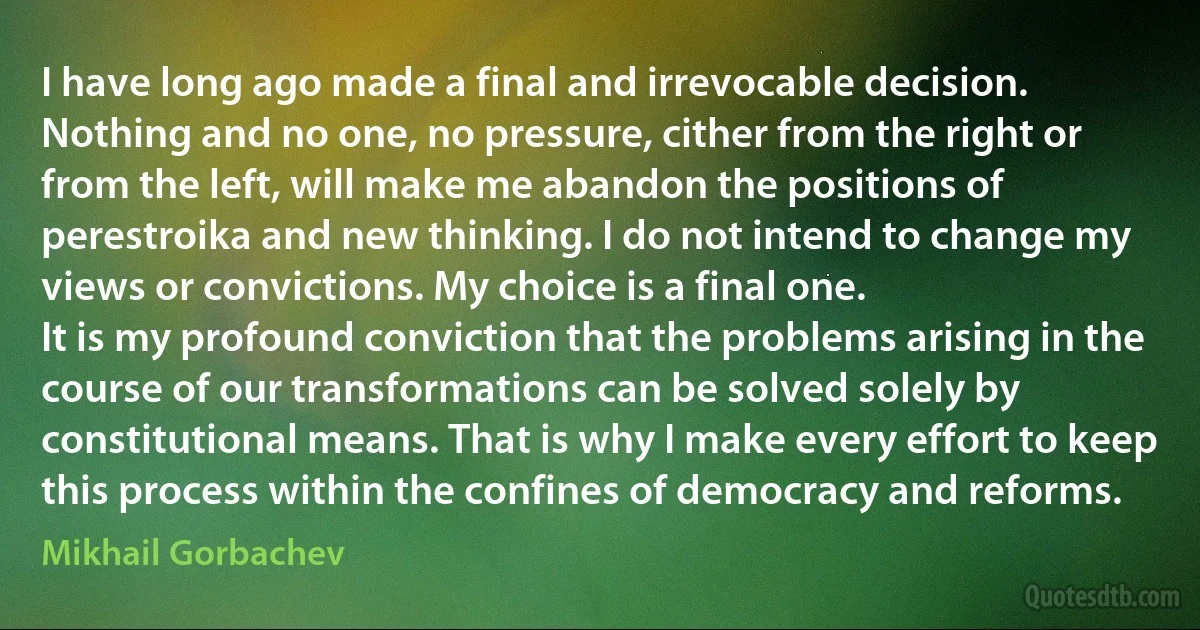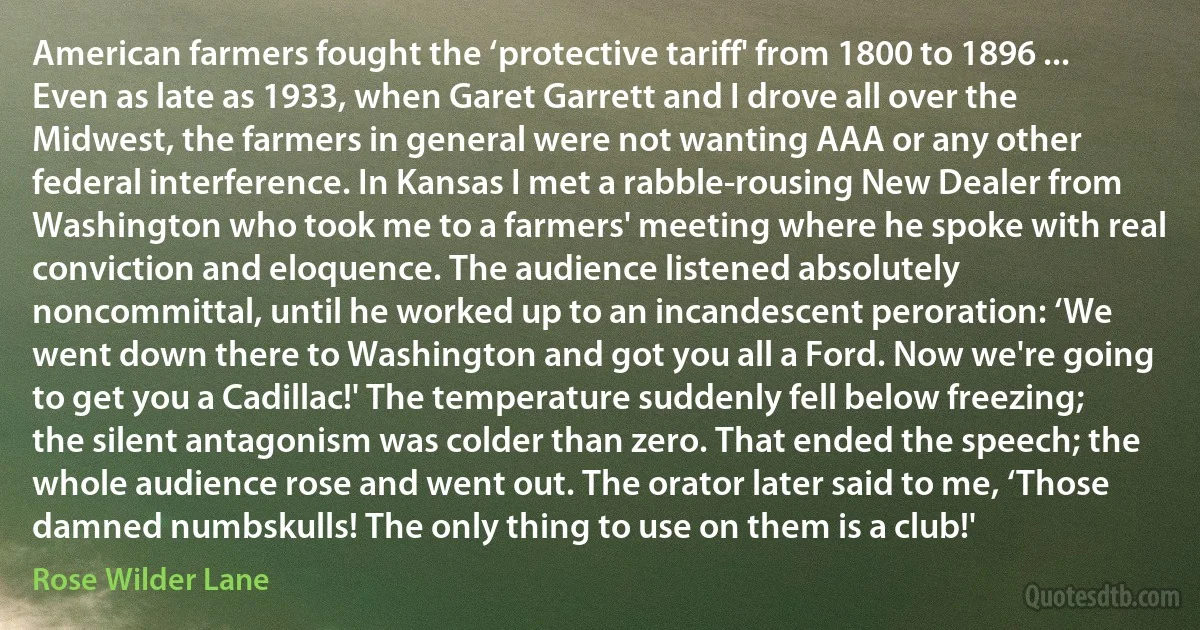Conviction Quotes - page 30
An irresistible passion that would induce me to believe in innate ideas, and the truth of prophecy, has decided my career. I have always loved liberty with the enthusiasm which actuates the religious man with the passion of a lover, and with the conviction of a geometrician. On leaving college, where nothing had displeased me more than a state of dependance, I viewed the greatness and the littleness of the court with contempt, the frivolities of society with pity, the minute pedantry of the army with disgust, and oppression of every sort with indignation. The attraction of the American revolution transported me suddenly to my place. I felt myself tranquil only when sailing between the continent whose powers I had braved, and that where, although our arrival and our ultimate success were problematical, I could, at the age of nineteen, take refuge in the alternative of conquering or perishing in the cause to which I had devoted myself.

Gilbert du Motier, Marquis de Lafayette
There is no doubt that all nations are aggressive; it is the nature of man. There start up from time to time between countries antagonistic passions and questions of conflicting interest, which, if not properly dealt with, would terminate in the explosion of war. Now, if one country is led to think that another country, with which such questions might arise, is from fear disposed on every occasion tamely to submit to any amount of indignity, that is an encouragement to hostile conduct and to extreme proceedings which lead to conflict. It may be depended on that there is no better security for peace between nations than the conviction that each must respect the other, that each is capable of defending itself, and that no insult or injury committed by the one against the other would pass unresented.

Henry Temple, 3rd Viscount Palmerston
The people of England are loyal to the House of Hanover, not from a vain preference of one family to another, but from a conviction that the establishment of that family was necessary to the support of their civil and religious liberties. This, Sir, is a principle of allegiance equally solid and rational;-fit for Englishmen to adopt, and well worthy of your Majesty's encouragement. We cannot long be deluded by nominal distinctions. The name of Stuart, of itself, is only contemptible;-armed with the sovereign authority, their principles are formidable. The Prince, who imitates their conduct, should be warned by their example; and, while he plumes himself upon the security of his title to the crown, should remember that, as it was acquired by one revolution, it may be lost by another.

Junius
Hier bij Ajax ligt mijn hart,
een club fascinerend, altijd apart.
Door velen genoemd naar godenzonen,
voor mij de bakermat van voetbaliconen.
Mijn herinneringen gaan terug naar De Meer,
ook daar heerste een bijzondere sfeer.
Nu ga ik mijn gevoelens weer achterna,
en treed technisch toe in de Arena.
In mijn levensfase is dit een nieuwe kans,
en mijn jeugdliefde krijgt een extra stimulans.
En daarom klinkt het vol overgave uit mijn mond,
vandaag is de cirkel echt rond.
Here with Ajax lies my heart,
a club fascinating, always unique.
By many named after sons of gods,
for me the origin of football icons.
My memories return to De Meer,
there too was found a special atmosphere.
Now I go after my feelings,
and technically enter the Arena.
In my life phase this is a new chance,
and my childhood love gets an extra impulse.
And that's why I state with full conviction,
today the circle is really complete.

Louis van Gaal
The artefacts of a genius are distinguished by rich human content, for which he forges new images and new techniques, creates new styles. He sees himself as a unique eruption in the desert of the banal. He feels himself mysteriously inspired or possessed. The craftsman, on the other hand, is content to use the traditional materials and techniques. The more self-possessed he is, the better craftsman he will be. What pleases him is skill of execution. He is very concerned with his contemporary success, his market value. If a certain kind of political commitment is fashionable, he may be committed; but out of fashion, not conviction. The genius, of course, is largely indifferent to contemporary success; and his commitment to his ideals, both artistic and political, is profoundly, Byronically, indifferent to their contemporary popularity.

John Fowles
Islam has been reborn, in part because of the new material wealth acquired by the Islamic countries, but mainly because of people's conviction that Islam can provide a valid spiritual foundation to their lives. Such a foundation seems to have eluded old Europe, which, despite its enduring political and economic power, seems to be on the road to decline and fall.

Pope Benedict XVI
In this era of ubiquitous information, complexity, and intense scrutiny, it is becoming routine to respond to reports of character flaws in business, athletics, and politics with an indifferent shrug and a "Yes, but..." It's becoming easier to rationalize a lack of character by emphasizing accomplishments, as though this were a binary choice. It's becoming commonplace that character flaws are greeted with skepticism. In this environment, character matters even more. Building teams requires bringing together individuals with the right credentials, commitment, and character. A lack of any one of these will eventually mean trouble. Our teams- both leaders and followers- will and should be judged not only by what they accomplish but also by how. Neither leading nor following will be effective if personal interactions and beliefs are considered mere differences in perception. Rather, both leading and following require conviction and character.

Martin Dempsey
It is not one, I think, of which we have any cause to be ashamed. We have endeavoured to exercise a steadying and moderating influence in the politics of the world, and I think and hope that we have conveyed not merely the impression, but the conviction that, whatever other Governments or countries may do, the British Government is never untrue to its word, is never disloyal to its colleagues or its allies, never does anything underhand or mean; and if this conviction be widespread, as I believe it to be, that is the real basis of the moral authority which the British Empire has long exerted and, I believe, will long continue to exert in the affairs of mankind.

George Curzon, 1st Marquess Curzon of Kedleston
Complete freedom meant - no one knew. It was most readily defined in the negative: not this gap between the heaven promised in the new advertisements and the everyday satisfactions I can buy. Not the sense that when I leave my work for my family, and bring my family to a Sunday in the park, my leisure feels like work. Not this mad conviction that I'm a stranger in my own home town, that at work I feel like a machine, that in the park I feel like an advertisement, that at home I feel like a tourist.

Greil Marcus
[It is] a question of personal appeal and conviction, rather than any argument. The cards I fancy are sympathy, understanding of his hopes, suspicions and disappointments, but above all, striving to convey to him, through what one says, a real echo of the sincerity that pervaded your doings in London.

Edward Wood
I cannot provoke controversy by saying it is the Liberal Party, but it is Liberalism which has made England what it is to-day, and it will endure. As long as people are what they are in this country, they will be liberal, even if they do not belong to the Liberal Party. We have been attached to individual liberty and tolerance, but the British people have shown that, while they prized liberty above everything and would not tolerate the loss of liberty, they also have the conviction that order must be preserved in order that liberty may be enjoyed.

Edward Grey, 1st Viscount Grey of Fallodon
...Those individuals to whom we owe the great creative achievements of science were all of them imbued with a truly religious conviction that this universe of ours is something perfect, and susceptible through the rational striving for knowledge. If this conviction had not been a strongly emotional one, and if those searching for knowledgehad not been inspired by Spinoza's amor dei intellectualis, they would hardly have been capable of that untiring devotion which alone enables man to attain his greatest achievements.

Baruch Spinoza
The quintessential revolution is that of the spirit, born of an intellectual conviction of the need for change in those mental attitudes and values which shape the course of a nation's development. A revolution which aims merely at changing official policies and institutions with a view to an improvement in material conditions has little chance of genuine success. Without a revolution of the spirit, the forces which produced the iniquities of the old order would continue to be operative, posing a constant threat to the process of reform and regeneration. It is not enough merely to call for freedom, democracy and human rights. There has to be a united determination to persevere in the struggle, to make sacrifices in the name of enduring truths, to resist the corrupting influences of desire, ill will, ignorance and fear.

Aung San Suu Kyi
Those of us who decided to work for democracy in Burma made our choice in the conviction that the danger of standing up for basic human rights in a repressive society was preferable to the safety of a quiescent life in servitude. Ours is a nonviolent movement that depends on faith in the human predilection for fair play and compassion.
Some would insist that man is primarily an economic animal interested only in his material well-being. This is too narrow a view of a species which has produced numberless brave men and women who are prepared to undergo relentless persecution to uphold deeply held beliefs and principles. It is my pride and inspiration that such men and women exist in my country today.

Aung San Suu Kyi
I have read half your book thro' and I am immensely charmed by it. But some things I disagree with and more I do not understand. This does not apply to the characters, but to your conclusions, e.g. you say "women are more sympathetic than men." Now if I were to write a book out of my experience I should begin Women have no sympathy. Yours is the tradition. Mine is the conviction of experience. I have never found one woman who has altered her life by one iota for me or my opinions. Now look at my experience of men. A statesman, past middle age, absorbed in politics for a quarter of a century, out of sympathy with me, remodels his whole life and policy - learns a science the driest, the most technical, the most difficult, that of administration, as far as it concerns the lives of men, - not, as I learnt it, in the field from stirring experience, but by writing dry regulations in a London room by my sofa with me. This is what I call real sympathy.

Florence Nightingale
Hatred is a thing of the heart, contempt a thing of the head. Hatred and contempt are decidedly antagonistic towards one another and mutually exclusive. A great deal of hatred, indeed, has no other source than a compelled respect for the superior qualities of some other person; conversely, if you were to consider hating every miserable wretch you met you would have your work cut out: it is much easier to despise them one and all. True, genuine contempt, which is the obverse of true, genuine pride, stays hidden away in secret and lets no one suspect its existence: for if you let a person you despise notice the fact, you thereby reveal a certain respect for him, inasmuch as you want him to know how low you rate him - which betrays not contempt but hatred, which excludes contempt and only affects it. Genuine contempt, on the other hand, is the unsullied conviction of the worthlessness of another.

Arthur Schopenhauer
Turning and turning in the widening gyre
The falcon cannot hear the falconer;
Things fall apart; the centre cannot hold;
Mere anarchy is loosed upon the world,
The blood-dimmed tide is loosed, and everywhere
The ceremony of innocence is drowned;
The best lack all conviction, while the worst
Are full of passionate intensity.Surely some revelation is at hand;
Surely the Second Coming is at hand.
The Second Coming! Hardly are those words out
When a vast image out of Spiritus Mundi
Troubles my sight: a waste of desert sand;
A shape with lion body and the head of a man,
A gaze blank and pitiless as the sun,
Is moving its slow thighs, while all about it
Wind shadows of the indignant desert birds.The darkness drops again but now I know
That twenty centuries of stony sleep
Were vexed to nightmare by a rocking cradle,
And what rough beast, its hour come round at last,
Slouches towards Bethlehem to be born?

William Butler Yeats
Basically I'm an optimist. Intellectually I can see man's balance is about fifty-fifty, and his chances of blowing himself up are about one to one. I can't see this any way but intellectually. I'm just emotionally unable to believe that he will do this. This means that I am by nature an optimist and by intellectual conviction a pessimist, I suppose.

William Golding
I support a great deal of what the President has done. I have voted with him 80% of the time. But my promise before God to apply impartial justice required that I put my personal feelings and biases aside. Were I to ignore the evidence that has been presented, and disregard what I believe my oath and the Constitution demands of me for the sake of a partisan end, it would, I fear, expose my character to history's rebuke and the censure of my own conscience.
I am aware that there are people in my party and in my state who will strenuously disapprove of my decision, and in some quarters, I will be vehemently denounced. I am sure to hear abuse from the President and his supporters. Does anyone seriously believe I would consent to these consequences other than from an inescapable conviction that my oath before God demanded it of me?

Mitt Romney
Fifty years ago, science took for granted that the rate of acceleration could not last. The world forgets quickly, but even today the habit remains of founding statistics on the faith that consumption will continue nearly stationary. Two generations, with John Stuart Mill, talked of this stationary period, which was to follow the explosion of new power. All the men who were elderly in the forties died in this faith, and other men grew old nursing the same conviction, and happy in it; while science, for fifty years, permitted, or encouraged, society to think that force would prove to be limited in supply. This mental inertia of science lasted through the eighties before showing signs of breaking up; and nothing short of radium fairly wakened men to the fact, long since evident, that force was inexhaustible.

Henry Adams



